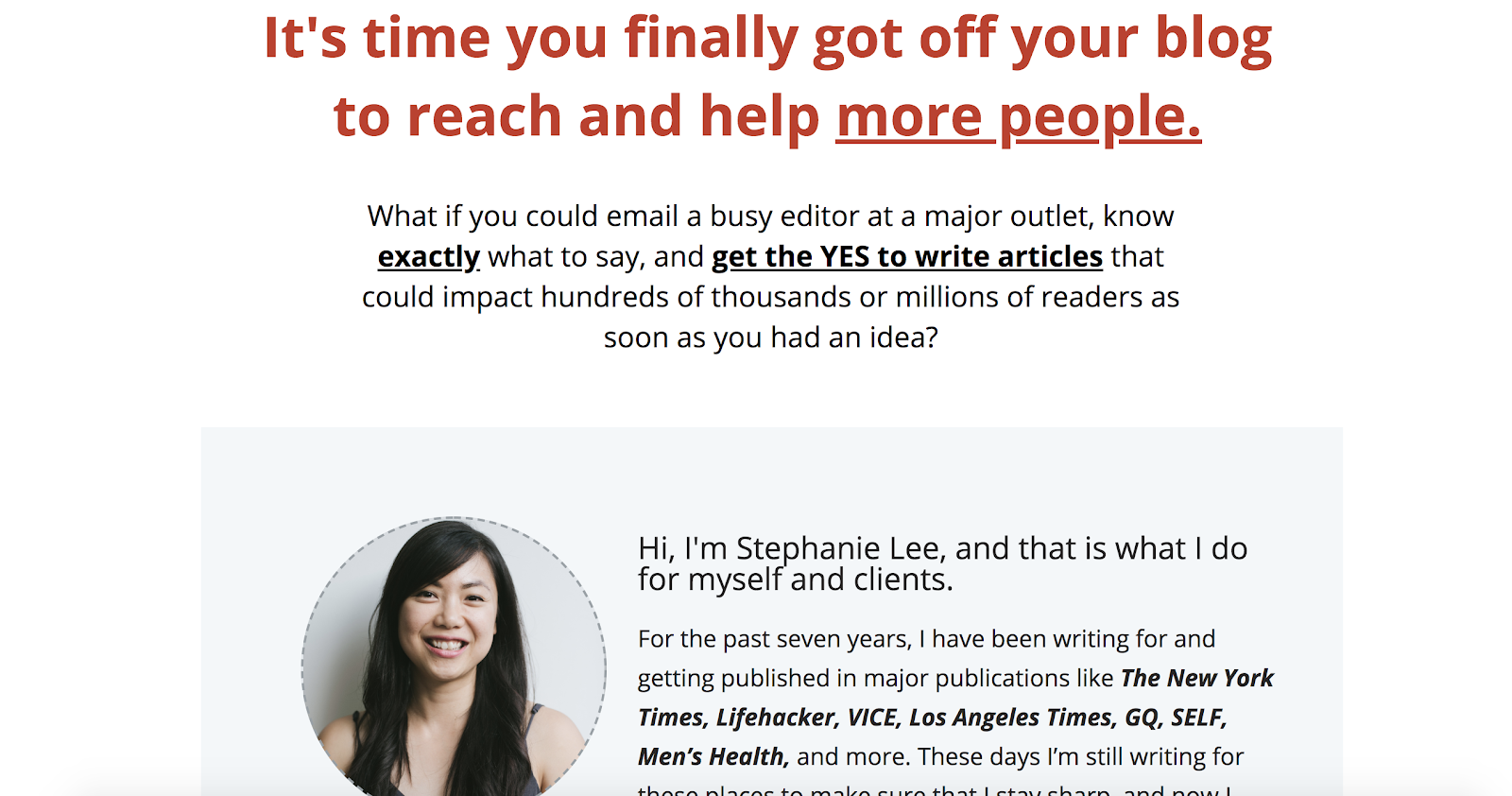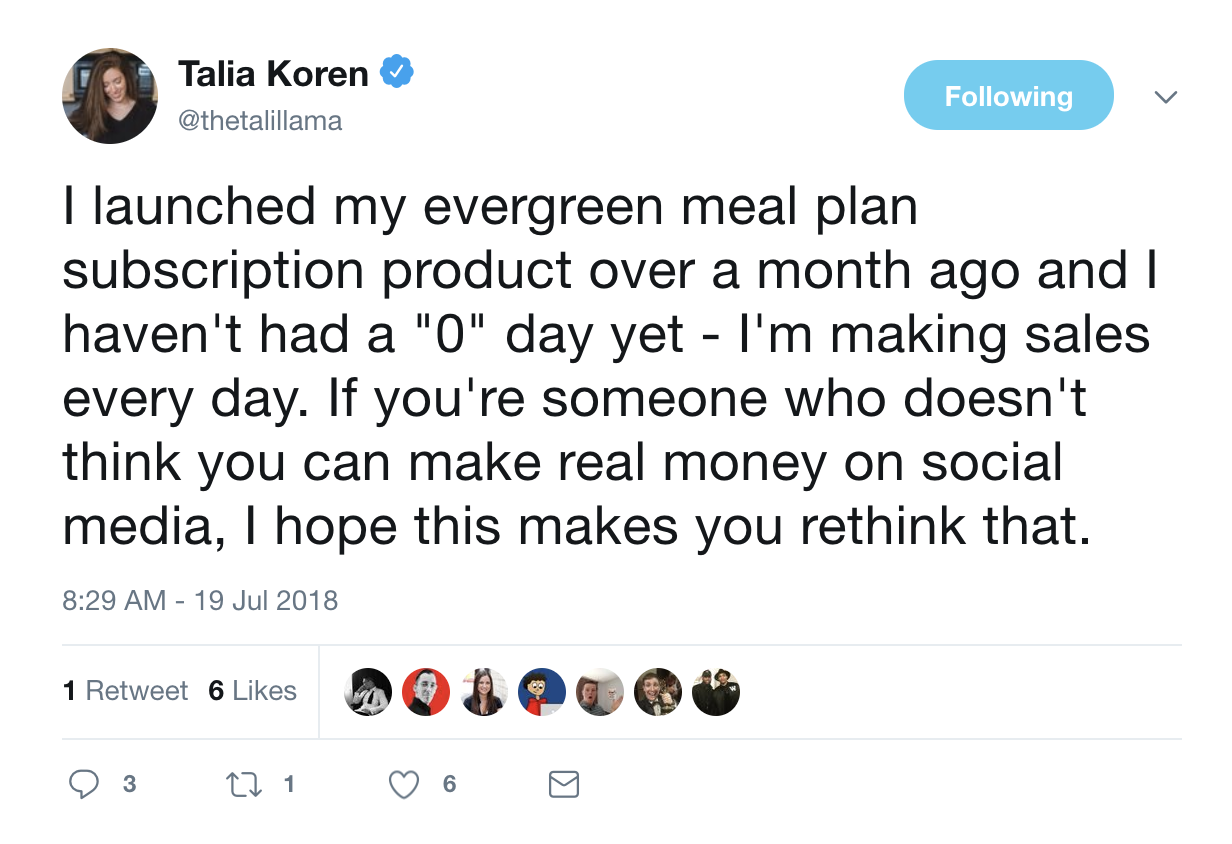Uttering the words “I want to start my own business” is a pivotal moment for anyone.
To make such a bold statement is to say that you are ready to take control of how and when to earn extra income every month, and maybe eventually go on two-hour lunch breaks without nosy colleagues wondering where you’ve disappeared to; or starting your day without passing by the same damn dry cleaners billboard on the 405 while wondering what bizarro world you’ve slipped into where EVERY radio station is playing the same damn Ariana Grande song.
Sounds like THE dream, doesn’t it? But…
There’s ALWAYS a “but,” which is often used to implicitly justify why starting a business won’t or can’t happen for you. Observe: “I want to start my own business…”
- “…but I don’t even know how or where to start.”
- “…but I don’t have enough time.”
- “…but I don’t have money.”
- “…but I don’t want to be screwed or look silly if it fails.”
And the list goes on. We’ve helped more than 10,000 students start businesses, side hustles, and everything in between, and we’ve seen every variation of these excuses. We get it: an excuse is a very human impulse when you’re scared.
It’s OK to be scared. Trust me when I say that we’ve all been there. Starting a business can feel like this ginormous daunting task that a few select people have magically figured out, and then promptly monopolized the success pie, leaving but backwashed saliva and crumbs for everyone else — so you think: why bother?
Know that your “buts” are just excuses that you tell yourself to make yourself feel better about doing things half-assed … or nothing at all.

But actually: you do have control and a thriving business IS within your reach. Just open your eyes to the many successful online businesses around you:



These business owners aren’t anyone particularly special. Just people like you who were sick of worrying about job stability yet still fantasized about taking that $4,500 vacation in Fiji and DID something about it. They quashed the once never-ending stream of excuses and rolled up their sleeves to get to work.
Of course, no one starts out immediately that way, even us GrowthLab staff members who help others start and build their businesses as part of our job. WE “should” know better, but we don’t always. For example, one of our staff writers confesses that she has 42 pages of business ideas and hasn’t yet been able to gain traction (but she’s working on it!).
I, too, was in a similar boat. I had talked and dreamed about starting a business for years, waiting for that magical moment when the universe was going to up and hand me a business like I deserved a nice prize for my fervent wishing.
That never happened obviously, but I did start my own business, prior to joining GrowthLab, when I finally recognized that starting a business was up to ME; and that, if I wanted things to happen, it was up to me to make them happen. And so I did something. Even if I had no idea what I was doing.

The reason for not starting is never that you don’t have time or that the stars haven’t aligned on the sixth day of summer solstice. You are simply letting yourself off the hook too easily.
It’s time to change that, fam, one excuse at a time.
Want to build a business that enables you to live YOUR Rich Life? Get my FREE guide on finding your first profitable idea.
Excuse 1: “I want to start my own business, but I have no idea where to start!”
The problem isn’t a dearth of information on how to start a business. It’s the opposite: There’s too much information.
The simplest way to look at starting a business is to think: What’s the most feasible, small step that gets you moving on the right track?
No, it’s not the logo. Or coming up with the perfect business name. Think about it: Before you can start anything, you need AN IDEA.
We’ve talked to and have helped thousands of students kick-start their businesses, and having a clear and concrete idea is far and away the number-one barrier to making the business a reality.
It’s so important and so harrowing a process that we have articles upon articles dedicated to helping you find an idea. And still, lots of people struggle to move past this step.
Our CEO, Ramit Sethi, walks you through, step by step, finding a business idea.
It’s normal to get stuck here. I was for years. My best advice for getting through this with your sanity and self-esteem intact is to accept that you won’t have a great idea right off the bat. It’s not going to be awesome the first time, not even close.
Rather, you’ll have a ton of crappy ideas, and that’s actually a GOOD thing. Only then will you be able to learn, tweak, better understand your strengths and weaknesses, and persist until you find the one winning idea that’ll blossom into the business you’ve always wanted.
Just be ready to let bad ones go to make room for the real gold. (For inspiration, I encourage you to check this article for 40 REAL business ideas and this guide for finding a profitable idea.)
Excuse 2: “I want to start my own business, but I don’t have enough time.”
Not having enough time is the ultimate cop-out.
Because if you truly cared about something, you’d do everything in your power to MAKE TIME for that thing. Otherwise, it’s just not that important, plain and simple.
Here’s an exercise: Next time you say “I don’t have time for X” rephrase it as “X is not a priority for me.” Does it feel terrible to say “Starting a business is not a priority for me”?
Then you’ll have to make room in your schedule, which may mean saying “no” to things, canceling routine things that no longer bring you joy, or being a little uncomfortable in the short term. https://embed.ted.com/talks/laura_vanderkam_how_to_gain_control_of_your_free_time
This TED talk tells you exactly what I just said…in friendlier terms.
If you’re constantly saying one thing, but your actions (not blocking off the necessary time to focus on that supposedly important thing, for example) don’t align with your intentions, what does that really say about what’s truly important to you?
Ergo, do you even WANT to start a business?

Time will always get away from you. It’s up to you entirely to prioritize and take back control of it.
Excuse 3: “I want to start my own business, but now’s just not a good time. ”
Nike said it best:
“Yesterday you said today.”
The T-shirt–worthy slogan captures the exact sentiment each of us tells ourselves when we want to do something and then procrastinate, ad infinitum. This is just your impossibly high standards for perfectionism holding you back. And before you know it, weeks, months, and years pass and still … nothing.
Done is better than perfect. 10% is better than 0%. A mistake can be better than not doing anything at all.
There’s NEVER going to be a right time. No green light or sign from the universe that’ll tell you it’s the perfect time. It’s entirely on you to determine when that will be.
In a few months or a year from now, you’ll be glad that you started and did something a little bit every day. Trust me.
Excuse 4: “I want to start my own business, but I don’t have money.”
Our best advice for when you don’t have money to start a business? Don’t go all-in with your business.
The smart way to start a business is to do it on the side while you have steady income. It’s more than just the smart thing to do, it gives you a peace of mind and the confidence to forge ahead. (And if you don’t have the basics met or are in debt, we suggest our sister site I Will Teach You to Be Rich to help you get that squared away first.)
Add this to the reading list, yo: Top 6 ways to earn money online with integrity.
Excuse 5: “I want to start my own business, but what if it fails? I’m not confident I can do this.”
When we start out, we tend to delude ourselves into thinking that our own path to success will be smooth sailing and end up severely underestimating how difficult things actually will be.
Seth Godin, author of marketing books like Purple Cow: Transform Your Business by Being Remarkable and The Dip: A Little Book That Teaches You When to Quit (and When to Stick), calls these difficult parts “the dip.”
It’s the point at which the journey becomes so harrowingly difficult that most people just give up … FOR GOOD. For doctors, the dip might be in the form of passing organic chemistry class or medical school. For some entrepreneurs, it’s passing the idea phase.
The dip will make you flail and thrash around, as if you’re failing but you’re not. Not really; it’s just part of the journey. And if you look: People have lost a ton of weight. People have become doctors. People have built successful businesses. You know these things are possible at least, but the question isn’t a matter of how.

The real question is: What did these people sacrifice in pain, effort, time, energy, money, and other resources to achieve what they did?
Understanding those sacrifices and costs is the first step to helping you make sure you have the necessary resources to overcome the dips, instead of succumbing to them.
If you only keep your head in the sand with an overly optimistic can-do attitude, things will really suck when you can’t get past the idea phase, no one is reading your blog posts, you fail your first launch, or any other myriad hard left turns this journey will force you on, leading you to wonder if you’re cut out for this entrepreneur stuff.
You are capable. You just need a realistic plan. Two GrowthLab posts that may help:
Excuse 6: “I want to start my own business, but who am I to start and run a successful business?”
Some of us doubt that we even have the qualifications to be an entrepreneur. And so we wait for some fictitious organization of Powers That Be to wave a magic wand and give us their approval.
As if they’d beam down to earth and say, “Hey, I’ve been thinking. You’d make a MUCH better entrepreneur than being a small piece of a bigger machinery. In fact, here’s your new business, all prepped and ready for you — you’re welcome!”
No one is going to hand you anything on a silver platter or give you permission or tell you what to do. Y Combinator founder Paul Graham dishes that last point out, served ice cold:
“When you’re a child, your parents tell you what you’re supposed to do. Then, you’re in school, and you’re part of this institution that tells you what to do. Then, you go work for some company, and the company tells you what to do. So people come in like baby birds in the nest and open their mouths, as if they’re expecting us to drop food in. We have to tell them, ‘We’re not your bosses. You’re in charge now.’ Some of them are freaked out by that. Some people are meant to be employees. Other people discover they have wings and start flapping them. There’s nothing like being thrown off a cliff to make you discover that you have wings.”
It’s all on you to discover yourself that you can flap those wings, too.
Excuse 7: “I want to start my own business, but no one believes in me or is supporting me.”
Not everyone is cut out to be an entrepreneur, and those of us who tread this path are weirdos. I say that with utmost endearment.
What entrepreneurs do isn’t easily understood. People know that SOMEHOW entrepreneurs make money online in the comfort of their home — and that’s kind of weird.
Just try to explain to someone that you write blog posts and emails, teach people how to do esoteric things via online information products, and have a long, complicated sales process in your business.
Unless they actually understand what any of those mean, you will likely be met with, at best, a blank stare; or at worst, passive-aggressive comments. It’ll be easy to feel so terribly alone in this. I’ve written about the emotional challenges of dealing with this lack of support, and the same message applies:
“Also, understanding that people’s ill judgments aren’t necessarily a personal assault. It’s not about you nor is it your fault that people act that way. These are not the people you should seek validation from anyway. And no one action is going to flip a magical switch where people suddenly understand. The best middle finger to all the haters is to keep your head down, do the work, and live the life that proves you are (and are capable of) handling your shit.”
Don’t worry about other people worrying about you handling your shit if you haven’t handled your own shit yet.
Excuse 8: “I want to start my own business, but I don’t have a business idea that’s original.”
Oftentimes people get caught up in trying to be completely original and novel, but if you look at most business ideas, they’re simply something that solves a real problem. Whether it’s helping people lose weight, get better at voice acting, or teaching them to mix better EDM music tracks — these are all interesting problems that people are willing to pay money to solve!
There’s no need to reinvent the wheel here; just solve real problems and make a difference in someone’s life.
Your need for originality comes from this misguided notion that because something has been done already there’s no room for you to compete. If we drill down another layer, your core bias is exposed: You think that there isn’t enough “success” in the world to go around.
This is the myth of limited success. Just think about all the diet books, recipe books, business books, and self-help books that are out there. There’s no way that they’re ALL completely original ideas; just information repackaged and marketed toward all different kinds of readers. And that’s okay! The market decides what is useful (yay capitalism!), not you.
This is what you aim to do with your business, too. You just have to aim to position yourself to be unique enough and reach the right kinds of customers. And trust me, there’s enough success to go around.

So many other entrepreneurs can empathize with the hesitations, fears, doubts, anxiety, confusion, and the jumble of tumultuous emotions you feel.
We’ve all been through them! But the real beauty of having your own business is that you can choose to push the throttle harder or ease up on the gas as much as you want — that’s real flexibility! You just need to start … and there’s never going to be a perfect time.
Want to finally turn your business from idea to reality?
You can keep Googling and reading all sorts of articles on how to finally get started on your business … or peek at how these people make $60k to $300K per year with just an internet connection.
No matter how weird or “niche” your skills are, you can turn them into a successful online business. Find inspiration and get started today with this free downloadable PDF guide that’ll prove your existing skills can make you money.
What you’ll learn from this downloadable guide:
- Why you DON’T have to create the next Google or Facebook to make money — see how regular people have turned their oddball skills into profitable businesses, ranging from management consulting to toilet training cats
- How each of these successful online businesses actually generates revenue
- Links to 30 successful online businesses in unexpected niches so you can explore their websites and see what they’re doing right
